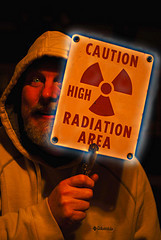Study: Radiation From TSA's Full-Body Scanners Poses "No Significant Threat"
In a new study that will surely be argued and dissected by both sides of the full-body scanner debate, researchers claim that the risk from the ionizing radiation to which travelers are exposed in these scanners “would be extremely small, even among frequent flyers” and that there “is no significant threat of radiation from the scans.”
The study, which appears in the journal the Archives of Internal Medicine, says that the the full-body scanners, more precisely, the more commonly deployed backscatter scanners, deliver an amount of radiation equivalent to 3 to 9 minutes of the radiation received through normal daily living.
The researchers also point out that, because flying inevitably exposes travelers to ionizing radiation, the radiation from the scanners is equivalent to around 1 to 3 minutes of flight time.
From the study:
[I]f a woman embarks on a 6-hour flight, she will be exposed to approximately 14.3 µSv of radiation from the flight and 0.03 to 0.1 µSv from passing through the scanner at the airport. Thus, the scan will increase her exposure by less than 1%. The suggestions that individuals who may be particularly vulnerable to radiation effects may want to avoid the scans are unwarranted concerns; the flights themselves may expose them to a small increased exposure to ionizing radiation, but the scans will further increase that exposure by a only a very small amount.
The study’s authors say that it would take over 50 passes through an airport scanner to equal the exposure of a single dental radiograph; 1000 scans to equal the exposure of a chest radiograph; 4000 scans to equal a mammogram; 200,000 scans to equal the exposure of a single abdominal and pelvic computed tomographic scan.
Of course, what the study can’t address is whether or not the minimal additional exposure is worth the minimal additional security these scanners are intended to provide.
You can peruse the study for yourself here.
Want more consumer news? Visit our parent organization, Consumer Reports, for the latest on scams, recalls, and other consumer issues.


